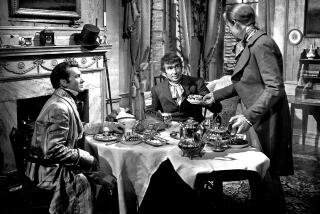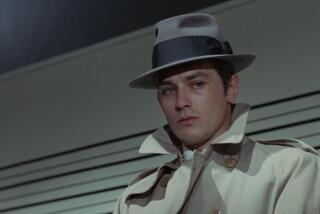David Rayfiel dies at 87; screenwriter collaborated with Sydney Pollack
David Rayfiel, a screenwriter and master script doctor who made his mark — often uncredited — on films by director Sydney Pollack that frequently featured Robert Redford, including “Three Days of the Condor,” “The Way We Were” and “Out of Africa,” has died. He was 87.
Rayfiel died Wednesday at Mount Sinai Medical Center in New York City of congestive heart failure, said his daughter, Eliza Roberts.
The rich collaboration between Pollack and Rayfiel began in the early 1960s, endured for more than 40 years and encompassed at least 15 films.
“My dad was never the same after Sydney died” at 73 in 2008, “but he did continue working,” his daughter said.
When “Out of Africa” (1985) won an Academy Award for best picture, Pollack thanked Rayfiel for “keeping us honest.” Kurt Luedtke, upon accepting the Oscar for his screenplay, also acknowledged Rayfiel.
The film was one of several that came out of an alliance that included Redford, who appeared in Pollack’s “Havana” (1990), “The Electric Horseman” (1979) and “Jeremiah Johnson” (1972), all of which Rayfiel wrote or rewrote.
Redford considered Rayfiel “the unsung hero of almost every picture Sydney Pollack and I have made together,” Redford told the New York Times in 1986.
Most screenwriters “write on the surface,” Pollack said in the 1986 article. “If they want you to know something about a character, they’ll simply have the character say it or have another character say it about him. David doesn’t do that. He writes elliptically, so it comes out organically, the way you would know something about someone in real life.”
Barbra Streisand, who sought Rayfiel’s input for her 1983 film “Yentl,” said in 1986 in the New York Times that he could show friction in a relationship by having a couple talk “about pits in their orange juice when they’re really saying the marriage is over. That’s what David is so good at.”
Fluent in French, Rayfiel had worked with French director Bertrand Tavernier on the futuristic drama “Death Watch” (1980) and “Round Midnight,” a well-reviewed 1986 film about a self-destructive American jazzman living in Paris.
Director Ingmar Bergman turned to Rayfiel for help on the 1977 film “The Serpent’s Egg” as did director Sidney Lumet for the 1986 mystery “The Morning After,” which featured Jane Fonda as an alcoholic actress.
Within the movie business, Lumet told the New York Times in 1986, “the word is, if you’ve got trouble with your picture, get David.”
Born Sept. 9, 1923, in New York City, he was the second of three sons of Leo F. and Flora Rayfiel. His father was a Democratic congressman and a judge.
After growing up in Brooklyn, he attended Brooklyn College but left to serve in the Army in Europe during World War II.
Rayfield earned a bachelor’s degree at Brooklyn College in 1947 and studied playwriting at Yale University, where he earned a master’s degree in 1950. The same year he married a fellow student, actress Lila Paris. They had a daughter, Eliza, and divorced in 1953.
During the 1950s, he mainly worked in television, writing for the late-night show “America After Dark” and for the game show “Who Do You Trust?”
Rayfiel’s play “P.S. 193” was produced off-Broadway in 1962 and led him to write for several television dramas, including one directed by Pollack.
After Pollack directed “P.S. 193” at UCLA in 1964, the pair collaborated on Pollack’s debut as a film director, 1965’s “The Slender Thread,” which featured Sidney Poitier and Anne Bancroft.
Among Rayfiel’s favorite films he worked on with Pollack were the 1969 war drama “Castle Keep” and the 1975 CIA thriller “Three Days of the Condor,” his daughter said.
When he was asked to work on the “Condor” screenplay, which was based on the novel “Six Days of the Condor,” his family said Rayfiel told filmmakers: “There are no six days here. I can give you three.”
The 1975 Los Angeles Times review of “Condor” praised the script as “slick, literate and efficient.”
One line of dialogue by Rayfiel — “You think not getting caught in a lie is the same thing as telling the truth” — appeared in “Condor” and at least three other Pollack films: “The Slender Thread,” 1966’s “This Property Is Condemned” and 2005’s “The Interpreter.”
Rayfiel viewed the recycled dialogue as a homage. “The French do it all the time,” he told The Times in 2005. Only “11 people remember hearing it.”
He was loath to take credit for rewriting a script and basked in the relative obscurity with which he lived his life at his country home in upstate New York and his New York City apartment.
In 1963, he married actress Maureen Stapleton, whom he had met when she appeared in a play with his first wife. They divorced in 1969.
The easygoing Rayfiel “needed nothing” and was an avid reader who always had three books going, said his third wife, Lynne Schwarzenbek-Rayfiel. She was a flight attendant when they met in 1972.
His involvement with a movie usually began with a “three-week” call from a director, Rayfiel told the New York Times in 1986.
“Someone tells me, ‘We’ve got a script here. It’s almost ready, just needs a little work. Shouldn’t take more than three weeks to fix it,” he said. “It’s always three weeks. Six months later, I’m finished.”
Besides Lynne, whom he married in 1987, and his daughter Eliza, an actress who is married to actor Eric Roberts and lives in Sherman Oaks, Rayfiel is survived by his stepchildren from his marriage to Stapleton, Danny Allentuck of New York City and Katharine Allentuck of Lenox, Mass.; a brother, Howard, of Sarasota, Fla.; and two grandchildren.
More to Read
Start your day right
Sign up for Essential California for the L.A. Times biggest news, features and recommendations in your inbox six days a week.
You may occasionally receive promotional content from the Los Angeles Times.





















































